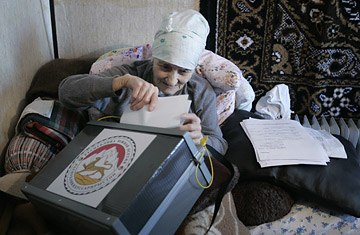
A woman drops her ballot into a ballot box at her home in Tskhinvali
More than nine months after the Russian army moved in to help the enclave of South Ossetia to self-proclaimed independence from Georgia, the promised repairs to buildings gutted by fighting have failed to materialize. So did Sunday's elections in the impoverished region deliver a painful reckoning to the incumbent? Hardly. As expected, former wrestler Eduard Kokoity, first elected President in 2001 when South Ossetia was still firmly if unwillingly part of Georgia, was overwhelmingly confirmed in office in elections he described as "a test of the stability of our democracy."
Right now he presides over the stability of squalor. Burnt cars and blown-out windows litter the outskirts of Tskhinvali, South Ossetia's largest town and self-styled capital. Kokoity's government received 10 billion rubles — $324 million at the current exchange rate — from Moscow to reverse the damage wrought by the five-day war. But residents have seen little evidence of any such spending. (See pictures of Russia's war with Georgia.)
The poll result may do little to speed things up, in fact. "The elections have not made any impact whatsoever. Everything that was will remain the same, they were just a game," says Alexei Malashenko, a scholar-in-residence at Moscow's Carnegie Institute. He points out that Kokoity has not only the support of his own Unity party, but also that of the only other two parties in South Ossetia's 34-seat legislature, the communists and the People's Party. The only democratic opposition is outside parliament altogether.
At present South Ossetia is only recognized by Russia and Nicaragua; the rest of the world still views it as part of Georgia. In a concrete reminder of its Western aspirations, Georgia has been hosting month-long NATO military exercises, which including drills in riot control and neutralizing suicide bombers. Moscow roundly condemned the exercises, which President Dmitry Medvedev described as an "act of overt provocation." (See pictures of Russia celebrating Victory Day.)
Unlike Georgia's other separatist region, Abkhazia, which has a port and a coast attractive for tourists, South Ossetia has scant economic activity, making it largely dependent on Russia. Kokoity has frequently expressed hopes that South Ossetia would join North Ossetia, across the border in Russia proper, to recreate Alania — the land South Ossetians see as their ancestral homeland. But Russia, mindful of international disapproval for changing borders by force, has announced no plans to absorb the region into the Russian Federation.
Before the August war, many South Ossetians made ends meet by trading food with neighboring Georgia, but the economy survived largely due to Russia's assistance and the illegal trade of arms, drugs and counterfeit money. That trade has fallen off since the tension on Georgia's border with South Ossetia and now unemployment is soaring under the separatist region's red, white and yellow flag. Kokoity's extra-parliamentary opposition, such as Vyacheslav Gobozov of the Fatherland Party, accuses him of theft and corruption.
Many South Ossetians have left to find work elsewhere. Alan, who didn't want to give his surname, works in Moscow as a driver and sends money home to his family in Tskhinvali. He says that the region cannot continue the way it is. "There are no jobs except for construction-repair jobs, and those positions that are available are paid close to nothing," he says. "Young people leave South Ossetia as soon as they turn 18."
Despite the momentous budget allocated to repairs, Alan's relatives have had to spend their own funds to fix their homes. Many other locals spent the winter in roofless apartments, or even camped in their courtyards. "The region has always been an economic black hole," said Malashenko. "Its future has nothing to do with Kokoity, but with Russia and its relationship with the other Caucasian territories." (Read: "Russia and Ukraine Battle Over Their Shared History.")
There are hints that Russia's support for Kokoity is running out. The Fatherland party has accused Kokoity of attempting to amend the constitution so that he can stay in power after his term ends in 2011. But last month the head of the Russian presidential administration, Sergey Naryshkin, advised him on national television to keep to the existing term limits.
It seems unlikely, then, that Sunday's elections will mark anything like a resurgence for benighted South Ossetia. "People don't believe that the elections were fair; they are losing faith," said Alan. "If nothing is done, and promises aren't delivered, then we will protest. I know eventually we will get what we want." Judging by past events, it will not come easily.
